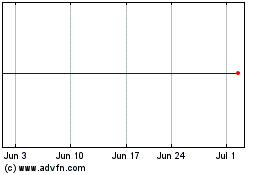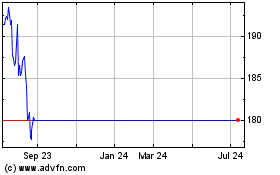Johnson & Johnson Opioid Verdict Cut -- WSJ
November 16 2019 - 3:02AM
Dow Jones News
By Sara Randazzo
This article is being republished as part of our daily
reproduction of WSJ.com articles that also appeared in the U.S.
print edition of The Wall Street Journal (November 16, 2019).
An Oklahoma judge reduced a verdict against Johnson &
Johnson by more than $100 million in a closely watched opioid case,
an expected move that fell short of the amount the company
requested.
State court Judge Thad Balkman said on Friday that Johnson &
Johnson must pay $465 million to help alleviate the damage caused
by opioid addiction in Oklahoma. Judge Balkman in August had
ordered the drug company to pay $572 million after finding it
contributed to an opioid-addiction crisis that has killed more than
6,000 Oklahomans since 2000.
In his ruling, the judge said the updated amount, which reflects
a mathematical error he previously said he made, is an estimate of
one year's worth of treatment and other programs. He rejected a
request from Oklahoma to allocate money for 20 years or more of
treatment.
Johnson & Johnson said it plans to appeal the ruling, saying
it "is neither supported by the facts nor the law."
The opioid lawsuit filed by Oklahoma's attorney general was the
first to go to trial out of thousands of similar cases brought by
cities, counties and states that claimed drugmakers and
distributors are responsible for fueling the opioid epidemic by
marketing the drug too aggressively and not providing oversight.
Johnson & Johnson became the lone defendant in that trial after
two other drugmakers settled with the state.
A second highly anticipated opioid trial slated to take place in
federal court in Ohio last month was called off after several
drugmakers and distributors agreed to collectively pay more than
$300 million to two Ohio counties.
Attention on the topic is next focused on settlement talks led
by a bipartisan coalition of state attorneys general who aim to
resolve the majority of the opioid lawsuits at once.
Johnson & Johnson has agreed to pay $4 billion as part of
those broader talks, but finalizing the deal is still far from
certain.
Dozens of attorneys general gathered in Washington this week to
discuss the settlement framework, which also includes a proposed
$18 billion to be paid over 18 years by three major drug
distributors: McKesson Corp., AmerisourceBergen Corp. and Cardinal
Health Inc. Another company involved in the talks, Israel-based
drugmaker Teva Pharmaceutical Industries Ltd., has agreed to
contribute billions of dollars of addiction-treatment drugs and
$250 million in cash.
The attorneys general on Thursday spent several hours discussing
how settlement money would be shared, according to people familiar
with the day's events.
Two proposals that received widespread agreement, the people
said, would divvy up the money by state based on factors including
population, overdose death rates and the number of prescription
painkillers that came into the communities. Just under 2% of the
overall settlement amount would also be directed toward smaller
states that have been hardest hit by opioid addiction, one of the
people said.
One issue the attorneys general are grappling with is antitrust
concerns that could surface from Teva donating billions of dollars
worth of the generic version of Suboxone, an addiction treatment
drug, the people said. Giving away the drug for free could undercut
competitors that sell Suboxone and similar drugs, but antitrust
specialists are working on a way to ensure the deal can go forward,
the people said.
Another ongoing issue discussed Thursday was how much of the
settlement would be directed toward paying private plaintiffs'
attorneys that represent local municipalities and some states, the
people said. The amount that could reach $1 billion.
Some cities and counties, meanwhile, say they feel cut out of
the broader settlement talks and want more money out of the
companies.
A group of nine large cities and counties, including New York,
Phoenix, Houston, Chicago and San Diego, emailed a letter Thursday
night to lawyers for the big three distributors expressing concerns
with the settlement agreement and how it was reached.
"The current proposed settlement is too little, too late," the
cities write in the letter, which was viewed by The Wall Street
Journal. Spreading the money over 18 years "does not come quickly
enough to make a meaningful contribution to confronting the
epidemic we face today."
Cardinal and McKesson declined to comment. Representatives for
AmerisourceBergen didn't respond to a request for comment
Friday.
(END) Dow Jones Newswires
November 16, 2019 02:47 ET (07:47 GMT)
Copyright (c) 2019 Dow Jones & Company, Inc.
AmerisourceBergen (NYSE:ABC)
Historical Stock Chart
From Mar 2024 to Apr 2024

AmerisourceBergen (NYSE:ABC)
Historical Stock Chart
From Apr 2023 to Apr 2024
